For centuries, farmers have been selecting seeds each season based on performance, making them better tasting, higher yielding, different looking, longer storing, or resistant to diseases and insects. Since the middle of the last century, targeted plant breeding has accelerated this process, further improving characteristics, including drought tolerance. In the 1980s, scientists began using biotechnology, including methods of transferring genes for a specific trait directly into a plant.
Examples in food crops include resistance to certain pests, diseases, environmental conditions, longer shelf life, resistance to herbicides, or improving the nutritional value of the crop. Products resulting from this method are referred to as genetically modified organisms, or GMs. Another more recent development in the field of biotechnology is CRISPR-Cas, or gene-editing, which makes it possible for scientists to alter plant DNA, providing more precision compared to other methods.
Planting and commercialization of GMs is subject to government approval in each country. A total of 24 countries planted commercial GM crops in 2017*. Among the top ten countries are index countries India, Pakistan, South Africa and Bolivia. Other index countries that planted GM crops are the Philippines, Myanmar, Colombia, Vietnam, Honduras and Bangladesh. In the African index regions, an increasing number of countries are allowing for further research into GM food crop varieties as well as cotton, notably Nigeria (cowpea, rice, sorghum, cassava, maize), Ghana (cowpea, rice), Burkina Faso (cowpea), Kenya (banana, rice, maize, cassava, sweet potato), Uganda (banana, maize, rice, potato, cassava), Tanzania (maize), Mozambique (maize) and Malawi (banana, soybean, cowpea). GM is mainly the domain of global (agrochemical) companies, development processes being costly and technology heavy. Companies with commercialized GM varieties of food crops in their portfolio include Bayer, Corteva Agriscience, Limagrain, Monsanto and Syngenta. Regional company Capstone Seeds (South Africa) has a GM soybean variety in its portfolio. Indian company Mahyco, in collaboration with Monsanto, also provided a license for its Bt brinjal, a GM open-pollinated eggplant variety, to the Bangladesh Agricultural Research Institute.
Although an increasing number of index countries is becoming more open to the use of and research into GM varieties, biotechnology in crops is a hotly debated subject worldwide. With an increasing demand for high-yielding varieties that address environmental, climate and nutritional needs, index countries appear to be seeking broader acceptance of GM varieties. Because most of these countries do not have the resources to invest in the necessary biotechnology themselves, collaboration with partners, including seed companies, is a requirement. Notable research collaborations already exist, such as Monsanto’s donation of technology to the African Agricultural Technology Foundation to develop regionally adapted cowpea varieties. Transparency around the aims and application of biotechnology and other new breeding techniques remains essential in the GM debate. This is where companies can also significantly contribute, sharing knowledge about these techniques and further collaborating with research institutes and national authorities to address food security needs.
* International Service for the Acquisition of Agro-biotech Applications (ISAAA), Global Status of Commercialized Biotech/GM Crops in 2017, Brief 53, 2018 (http://www.isaaa.org/resources/publications/briefs/53/download/isaaa-brief-53-2017. pdf).




